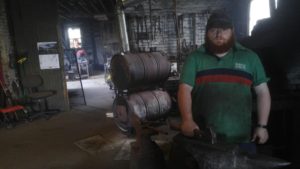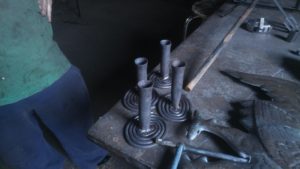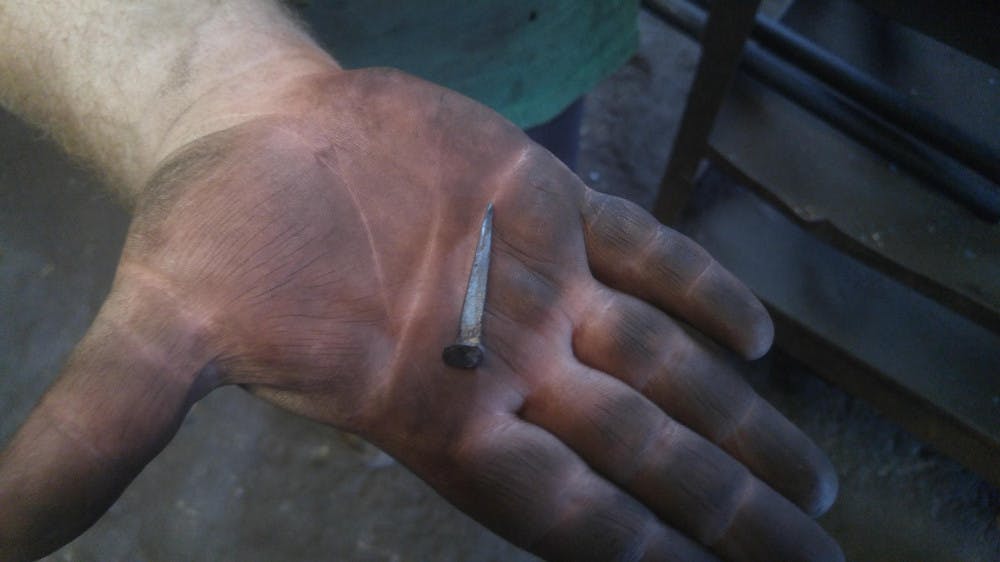By George Tatoris
News Editor
Everything happens for a reason.
That’s what Daniel Lapidow, a senior career and community studies major, believes.
Because of his belief in Hashgacha Pratis, or “divine providence” in Hebrew, Lapidow said his life has unfolded not because of chance or coincidence, but due to God’s will.
“Everything is wrapped together in one and everything is together in a way,” he said.
In a short span of time, Lapidow discovered two things that would come to define his life — his disability and his passion for blacksmithing.

As a child, Lapidow visited the Howell Living History Farm in Lambertville, N.J., for a lesson in cider-making. He was quickly drawn to the blacksmith demonstration. As he watched sparks fly, he knew he found his calling.
Soon after this discovery, he was diagnosed with dyslexia. Still, through his passion for blacksmithing, Lapidow learned that he could express himself creatively in ways the written word could not.
“I was able to go and practice once every weekend (at the farm) and focus on things that I could create with my mind instead of just having to read and write,” he said. “It started off as therapy and having fun with fire every now and then.”
At age 9, Lapidow became a member of the New Jersey Blacksmith Association. By age 12, he was apprenticed by Alex “Sasha” Parbuchenko, the master blacksmith at the Blacksmith of Trenton in Trenton, N.J. He continues to work there as an assistant between his career and community studies classes.
The College’s CCS program teaches students with intellectual handicaps independence. While students receive a certificate rather than a degree, Lapidow believes his time at the College will be beneficial.
“Sadly, the state, even though we take real college classes, doesn’t see (CCS) as a real organization — as real college life — so we don’t get a degree, but that’s no problem for me because I just want the knowledge,” Lapidow said.
Lapidow hopes the knowledge he gains from business and art courses will bolster his career as a blacksmith.
Students similar to Lapidow are required to take CCS-specific courses to build independence during their freshman year, followed by regular courses with the help of a peer mentor.
Maureen Hudson, a senior elementary and urban education double major, mentored Lapidow twice over the course of his college career.
“My role is to provide one-on-one support to build independence,” she said. “So, I meet the student where they are, I provide the support needed… and then I fade out.”
Hudson was impressed with Lapidow’s diligence.
“Lapidow has a sense of why he is here and what he wants to get out of his time at TCNJ,” she said. “He’s really always had a strong sense of self.”
During his junior year, Lapidow joined two clubs: Chabad, an orthodox Jewish community, and Rebel Art Movement, an art club that aims to have a strong artistic presence on campus.
Other members of RAM go to Lapidow for metalworking advice. He also made a ram statue for the club.
“They call me the metal master of the club,” Lapidow said.

Lapidow is also a founding member of Students for Disability Awareness. He participated in the club’s (dis)Ability Monologues in October 2015, where he spoke in-depth about his dyslexia and what he’d do if, miraculously, he woke up and could read normally.
All the same, he would not change his life.
“I can’t complain,” he said. “Once I learned to cope with it, it was just a really fun lifestyle.”
Lapidow was not always so confident. While he could shape metal at age 9, he could not do the same with his future. At times, he struggled to get academic help. The state refused to acknowledge his disability, assuming that he was simply lazy, he said.
After going through two private schools, he found the Newgrange School, a special education school in Hamilton, N.J.
“The teachers in that school basically saved my life because they taught me how to deal with (my dyslexia),” Lapidow said. “I was really depressed as a kid.”
Alfredo Cunha, Lapidow’s social studies teacher at Newgrange, became more than just a mentor, he became a friend.
Their relationship was kindled by an interest in role-playing games such as Dungeons and Dragons. During a free period, Cunha would host role-playing sessions with students.
Within these circles, peers are more open-minded, Cunha said, allowing Lapidow to think “outside the box.”
If Lapidow was ever bullied for his ideas at Newgrange, Cunha listened to him.
“I don’t think it was so much advice, but just being there understanding his point of view,” Cunha said. “Being open enough to not see him and his ideas as offbeat or weird, but just different ways of thinking.”
At Newgrange, Lapidow was still able to work on his blacksmithing.
Arleen Thompson, the art teacher at Newgrange, helped him get his apprenticeship in Trenton after seeing his work.
Students were also encouraged to enter pieces into the Mercer County Teen Arts Festival. Lapidow’s entry — a dinner bell — won first place at a state-wide competition. He gifted the bell to Newgrange’s principal.
“He doesn’t let (his disability) get in his way,” Cunha said. “He’s not just going to give up and say, ‘I can’t do this because I have this disability.’”
Ever devout to both his religion and blacksmithing, his friends dubbed him “The Hebrew Hammer.” Lapidow started a backyard blacksmith shop under his new moniker.
After graduating from high school, he didn’t want to return to school, however, his father convinced him otherwise. After looking at colleges as far as Vermont, Lapidow discovered the College right under his nose.
Lapidow’s entire life — his house, Newgrange, the Trenton Blacksmith and the College — can be seen in a single 30-minute drive. To Lapidow, this is no coincidence — it’s divine providence.







